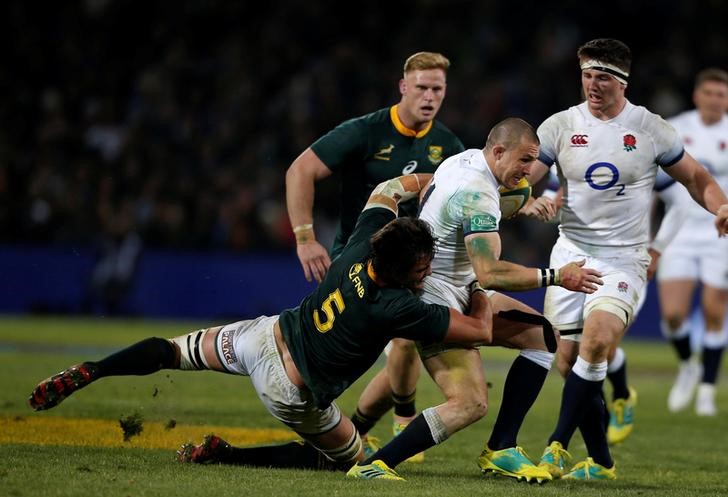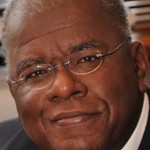
Prof Jansen: Why Do Things Never Fall Apart in South Africa?
Why does South Africa not fall off the precipice? Economists are clear that if this economy does not grow soon, the prospects of new jobs are dismal and rising unemployment will be our fate… writes Prof Jonathan Jansen. Educationists are clear that if the decline in education quality and the high drop-out rates continue, schools […]

Why does South Africa not fall off the precipice? Economists are clear that if this economy does not grow soon, the prospects of new jobs are dismal and rising unemployment will be our fate… writes Prof Jonathan Jansen.

Educationists are clear that if the decline in education quality and the high drop-out rates continue, schools and universities will fail to produce the expertise required to rebuild the economy.
Political scientists warn that the continued increase in social unrest and lawlessness, coupled with the loss of trust in public institutions, threaten the long-term stability of this young democracy.
Once again it seems as if the country is at the edge of the precipice – and yet, we never go over the edge. Which raises the puzzling question, what holds South Africa together?
The first is our remarkable capacity for self-correction.
There were about a dozen books in the late 1980s with frightful titles that warned of a racial bloodbath because of an intransigent white government and a widespread black resistance to apartheid.
John Brewer’s book, for example, put everyone on edge with its subtitle, Can South Africa survive – five minutes to midnight. And then February 2 happened, announcing the unbanning of liberation movements and Nelson Mandela walked out of prison, fist raised.
With every crisis, including the imminent collapse of the economy under Jacob Zuma, we self-correct and now we have a new president with the massive task of reconstruction and development.
Senior economists tell me we dodged a bullet and that we were on the verge of losing one of our major banks. But here we are.
The second thing is that we have this ability to laugh at ourselves during a crisis.
In the heat of the anti-apartheid struggle, the most popular comedian was Pieter Dirk-Uys who, in a strange way, eased the pain of the moment by using political comedy to demonstrate the utter farce of apartheid as ideology and as practice.
Emeritus Archbishop Tutu was a master in the use of this genre of political comedy to remind us how silly we all were.
More recently I watched from where I now reside how distraught Cape Town people were about the potential name-change to this airport that brings more tourists into the country than any other.
But black nationalists were on a roll and everything had to the carry the brand of African nationalism. Until someone posted this on social media. “The airport should be called Joe Masepus international airport. The locals will love it.”
You could almost feel the tension dissipate as everyone laughed at this very smart use of local language to show the finger at authority.
The third reason we do not fall off the edge is our incredible capacity for forgiveness.
“I have sinned against the Lord, and against you,” said the face of police violence and the killing of activists, Adriaan Vlok. Whether he was on his knees with the Mamelodi mothers who lost their sons on his watch or pleading with Frank Chikane whose clothes were poisoned in order to kill him, in each of those cases black South Africans forgave him.
He, in turn, would wash their feet with both parties overcome by tears. There is something deep within us, as South Africans, to both ask for and accept forgiveness. When the so-called Reitz Four, those white boys who racially abused five black workers at my former university, asked for forgiveness, the response was instant – of course, we do.
I know of no other country with this deep, spiritual capacity to forgive. Without it, we would not be here today.
The fourth reason why we are able to pull back from the afgrond (precipice) and that is our openness to ground-moving social and political gestures.
Mandela understood the power of gestures when he put on the No 6 rugby jersey at the Rugby World Cup or when he visited Tannie Betsie Verwoerd in Orania.
I teared up a few weeks ago when I was invited to the Wynberg Synagogue here in Cape Town whose leaders had invited a Muslim community to break their fast in this Jewish house of prayer.
Then, the Muslim brothers and sisters joined the Jewish worshipers for their Friday night Kiddush. When in other parts of the world churches are set alight and mosques destroyed by mortal enemies, here, on the southern tip of Africa, Muslims and Jews break bread together and, in the process, keep us all together.
The fifth is this: we avert disaster by our tenacity as a people, our determination to take on the long odds.
Nowhere was this tenacity more evident than in two major games on Saturday. After 18 minutes South Africa was 3-24 down in the first Test against the much better-ranked England.
By this time I was talking to the “ref” in all our official languages. It was over. And then, against the odds, this team led, symbolically, by the first black African captain of the national rugby squad, fought back and won the game 42-39.
On the other side of the world, in Paris, everybody expected Fiji to win the Sevens Rugby series that consists of 10 legs in 10 cities. They had won the last four legs and, to lose the series to South Africa, they had to lose in the quarter-finals and South Africa (who had only won the first leg in Dubai a long time ago) had to win the finals.
Guess what happened… and now we are the world champions again.
Finally, the sixth, what holds this country together is a powerful “moral underground”, tens of thousands of people who work as volunteers, behind the scenes, to make South Africa work.
I meet them every day, such as the gogo who does early-childhood care in her backyard for the children of working mothers and who receives training and resources from a farmer’s wife to make this possible. There are countless examples such as mentioned in my one posting over the past six years that truly went viral, and which was called My South Africa.
The Good News editor Steuart Pennington, would like to add a seventh, our extraordinary compassion.
I nearly ‘teared-up’ (to use Prof’s phrase) when I read the story of Xolani Luvuno, a leg amputee who ‘ran’ the 2018 Comrades. He grew up in the P.E township Motherwell, he dropped out in grade 8 and turned to a life of crime, gangsterism and drugs. After a five year stint in jail he was diagnosed with cancer and had his leg amputated above the knee. He ended up in Pretoria, begging at intersections and sleeping under a bridge at night, hooked on nyaope. In March 2016 Hein Venter, a ‘random’, but compassionate Pta businessman stopped and showed mercy, he gave Xolani some money and offered him a job. A keen runner himself Hein incentivised his staff to run, part health, part team building. R200 for a 10km team race to R 15 000 to run Comrades. Starting at midnight Xolani ran Comrades, he finished, no medal but R15000 from Hein. Xolani is not keeping the money, he is donating it all to the Ethembeni School for Disabled Children. (Are you teared up?)
So, yes, we are in trouble as a country. But we have reasons to hope that things will get better. After all, we have been at the precipice often and we still have cause to dream, for all the reasons mentioned.
By Prof Jonathan Jansen
Sourced with permission from: www.sagoodnews.co.za. Published on SAGoodNews FB page here.
